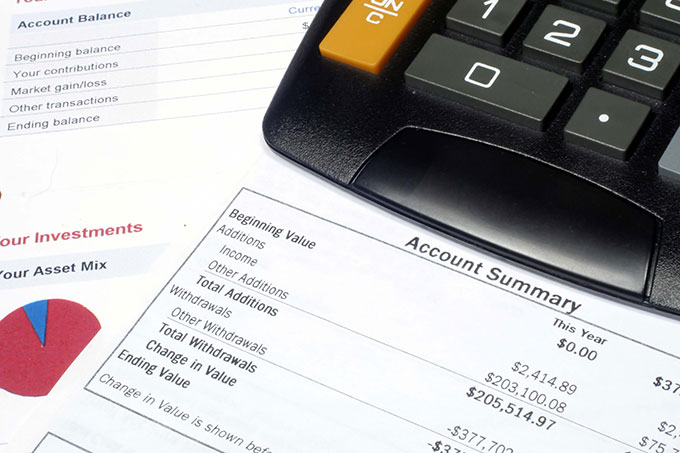
This tool was designed to help you take a "snapshot" of your current financial condition. While income and expense statement shows you your performance over a particular period of time (month, year, etc.), this calculator will show you your finances at a single point in time. That way, if you compute your net worth now, and then again a year from now, you will be able to tell whether your financial situation is improving or getting worse.
Complete the totals for each of the following sections. Once you've filled in the entire worksheet, click on the "Printer friendly report" button at the bottom of the worksheet. This will create a printer friendly condensed report in a new window that you can compare to your other financial reports.
If a field is not applicable to you, then you may leave it blank. Totals will automatically update as you enter any field values.
Enter your assets and liabilities into our below worksheet. Assets go in the left column while liabilities go in the right column.
Our rate table lists current home equity offers in your area, which you can use to find a local lender or compare against other loan options. From the [loan type] select box you can choose between HELOCs and home equity loans of a 5, 10, 15, 20 or 30 year duration.
On the surface, calculating your net worth looks to be relatively simple. However, looks can be deceiving.
On the one hand, it is largely a matter of simple arithmetic: subtracting what you owe (your liabilities) from what you own (your assets). On the other hand, there's more to figuring out your net worth than simply crunching numbers. You have to know which numbers to crunch, and what they represent.
You also need to understand that your net worth is constantly changing, and is influenced by every significant financial decision you make. Today's positive net worth can easily slip into the negative, jeopardizing your future financial independence. That being said, a negative net worth does not necessarily signal financial doom. With a bit of know how, and some hard work, a negative net worth can be turned to the positive, bringing a sound financial future back into focus.

Calculating your net worth is an important first step on the road to financial independence. It is a snapshot of your current financial status, and a map to your financial future. In this guide you will learn how to calculate your net worth, how it defines your fiscal health, and how it can help you achieve your financial goals.
Once you know your net worth, you will have a clearer picture of your current financial situation and will be better prepared to make informed decisions about your financial future. Knowing your net worth also provides insight into your past spending habits, overall debt profile, and ultimate earning potential. But figuring out your net worth should never be seen as a one time exercise, and there is an important point to be made here about when, and how often, you should take a cold hard look at the state of your finances.
By calculating your net worth on a regular basis, you can track the fiscal arc of your life. For some people that means an annual assessment of their net worth, while others may find it more beneficial to calculate their net worth on a semi-annual (or even monthly) basis. But whatever schedule you work to, figuring out your net worth on a regular basis gives you the flexibility you need to successfully manage your changing financial circumstances so you can realize your financial goals.
Assessing your net worth at regular intervals will give you insight into the following:
Before we move on to the nitty gritty of calculating your net worth, we should pause to look at some key terms that will be coming up throughout the process. Many of these will be familiar to you, but some may not. A quick review of these terms should make the process of assessing your net worth easier and more accurate.
Now that we've reviewed a few of the key terms you'll need to know, we're ready to begin calculating your net worth.
The process of figuring out your net worth is only made more complicated if you are disorganized from the outset. Gather all of your financial statements together (ideally you should already be keeping them filed away for easy access), and create a Net Worth File. Remember, calculating your net worth is not a one time exercise, and you will be referring to these documents again the next time you reassess your net worth.

Before you begin any calculations, you should decide if you are going to assess your net worth jointly or individually. If jointly, you will need to gather your partner or spouse's financial documents and combine them with your own. Naturally, any assets or liabilities that are shared between you will figure into an individual assessment as well as in a joint net worth investigation.
You hear it all the time in the media: "Mr. Jones, with a overall value of $14 million..."
But what does it really mean, and do you have to be wealthy to have a net worth? No, if you have two nickels to rub together, you have a net worth. That's assuming, of course, that the nickels are yours.
This value is everything you own minus what you owe in debts. In other words, it's your liabilities subtracted from your assets. For example:
 Your Assets
Your Assets
Your Liabilities
You're right in assuming that the term is used to denote a healthy state of finances. After all, you rarely hear people say things like, "Mr. Smith, with a negative value of $622..."
Why is determining your value so important? Well, it's your financial report card, your bottom-line value as a breadwinner, and much of what you do should be geared toward increasing your net worth.
The number itself is misleading because no one in his or her right mind would suddenly sell off all their assets to pay off all their debts. That said, we should think of it as more of a theoretical rating. Furthermore, many people hold assets in retirement accounts or trust funds that cannot be immediately converted into cash.
You can use the handy personal worth calculator we have provided (or calculate it yourself), but first it's important to understand exactly why your net worth is a good barometer for your fiscal health.
Every good financial decision you make likely increases your net worth, and every dumb decision chips away at it like a crazed woodpecker. If you win $50 from a scratch lottery ticket, your total assets will increase. Then again, if you spend the entire $50 at the convenience store after you cash it, you'll make no progress.
On the other hand, let's say you've joined a carpool team for commuting to work, and your monthly car expenses are suddenly cut in half. In essence, you have created wealth and your value goes up.
Even something as simple as brown-bagging your lunch at work or taking a trip to the recycling center with your cans and bottles can put you on the road to increased worth. If you make a conscious effort to weigh every financial decision against how it will affect your overall value, your decisions will automatically become more focused and sound.
Okay, it seems relatively simple to calculate your worth. Fortunately, the principle behind it is equally simple: the more you spend, the further your net worth drops, and anytime you can put a few cents in your savings account or piggy bank, it rises.
Still, many consumers don't understand how paying off debt can increase their overall value. After all, when you make a payment to pay down a credit card obligation, for example, you'll have a hole in your checking account that's exactly the same size as the decrease in your debt balance.
But here's the rub: your debt is now incurring lower finance charges. In turn, less of your money will go to the bank in the future, and your total worth slowly inches upward because you paid off some of your debt. Congratulations! Now reward yourself for your frugality, but nothing extravagant - perhaps another scratch lottery ticket.
To begin your personal balance sheet, make a list of all your assets. Usually, they are subdivided into three separate categories: liquid assets, investment assets, and personal assets.
You should avoid the temptation to inflate the value of your possessions just to boost your total worth. Be reasonable and use the market value of your personal assets, or what they would fetch on the open market, rather than what you paid for them.
Liabilities are also subdivided into three categories: current liabilities, long-term liabilities, and contingent liabilities.
Estimating the actual value of your total assets is probably the most difficult part of figuring out your net worth, and it is always best to err on the conservative side to ensure a more realistic view of your current financial standing. Some assets will be easy to place a value on (cash, bonds, CDs, etc), while others (real estate, investments, and pensions) will be a bit more difficult. However, with a little bit of research you should be able to arrive at a workable estimate that will allow you to generate a fair approximation of your current net worth.
So, to begin calculating your current net worth you must first make a list of all of your assets, assigning each an estimated cash value. That list of assets should include the following:
This list accounts for all of your liquid and illiquid assets. Once you have a final estimated total, you will be ready to figure out your total liabilities. After which, it is matter of simple mathematics to reach your current net wroth.
Now that you have estimated your total assets, it's time to look at your liabilities. Simply put, your liabilities include any and all debts you owe to another party. Figuring out your total liabilities is much easier than estimating your total assets, as you should be receiving (and paying attention to) monthly statements from your creditors. These statements are based on cold hard facts, and show how much you owe and to whom.
For some liabilities (mortgages, credit cards, etc), the statements may include estimates of what you would owe over time, including interest fees and surcharges. However, for the purposes of figuring out your current net worth, you must consider what it would cost to pay off all of your debts at this point in time out of the total cash value of all of your assets. Remember, paying off many of these outstanding debts may incur certain fees and penalties for early settlement, and this should be figured into your calculations.
Typical personal liabilities include the following:
With these figures in hand, you are ready to proceed to the next step – performing the final calculations that will give you your current net worth.
Once you have workable totals for all of your assets and liabilities, it's time to do the math, To figure out your net worth, simply subtract the sum total of your liabilities from your estimated total assets. If your assets total more than your liabilities, you have a positive net worth. However, if you have more liabilities than assets you will find yourself with a negative net worth. It's a simple as that. Of course, what you do with this information is vitally important.

If you have arrived at a positive net worth, you shouldn't expect to rest on your laurels. Now is the time to consider how you will pay down your outstanding debt, increase your savings, and plan out a diversified investment portfolio that will provide a comfortable retirement income.
If, however, you have a negative net worth there is no need to panic. You can use the information gleaned from your net worth assessment to plan a more fiscally sound future, taking steps to reduce your liabilities and increase your assets. This is one of the major reasons why performing a regular net worth assessment is so important, because it allows you to see where you are financially deficient and what you need to do to improve the outlook of your financial future.
Calculating your net worth provides you with an ever-changing indication of your financial progress. You may not know exactly where you want to end up financially, but you'll never get close unless you know where you are and where you need to go.
When your doctor takes your blood pressure, does he take it just once? No, and you should have the same attitude about your net worth calculation. If you tally your total worth regularly, you can plot it on a graph and see for yourself whether you are moving toward your goal.
If you're like most Americans, you'd rather not figure out your overall value, lest you end up with a paltry sum - or worse - a negative number. But whatever the number may be, it's a reflection of your financial standing, and you need to know. Otherwise, you'll learn that trying to budget your money without monitoring your total worth is like trying to shave without a mirror.
You should make an effort to calculate your net worth at least once a year. And because you'll already be wearing your accountant's hat, tax time is a good time. If possible, create a new balance sheet of your assets and liabilities on a quarterly basis so you can track minor victories and set short-term goals. Instead of having to wait a whole year to see the results, this will allow you to correct any miscalculations as soon as possible.
Naturally, your net worth will fluctuate over the course of your lifetime. Younger people, fresh out of college and starting a family, will have a lower net worth that reflects outstanding student loans and/or first time mortgages. Ideally, a working couple's net worth will increase over the years as they build equity in their home, enjoy career advancement, and acquire more assets. Finally, as people move into their retirement years it is not untypical for couples to see their net wroth dip slightly as they tap into savings and investments to replace their working income.
Again, this is why regular net worth assessments are so important. They help you track the financial arc of your life, so you can make changes where necessary to ensure your future financial independence.
It's possible that your calculations will show your net worth as a negative number, but there's no reason to panic. For example, someone who is just starting out in the workforce with a substantial amount of student loans may have a negative total. The same could be said of someone who has a car loan that will outlast the life of the car. The only cure for a negative number is time. Eventually, your total assets will outweigh the loan, so just be patient and diligent.
However, you can also send your overall value into a nosedive if you keep racking up huge bills without paying them off quickly. You'll eventually end up with a lengthy liabilities column and a very short list of assets.
The net worth calculator can also display your current ratio, which is your liquid assets divided by your current liabilities. This will give you a number predicting the likelihood that you'll be able to meet your current financial obligations. The higher your current ratio, the more likely you will be able to pay your upcoming bills.
Your debt ratio is an indication of your financial stability, and it's determined by taking your total liabilities and dividing them by your net worth. The lower your debt ratio, the better.
Hopefully, looking at your total worth will spur you on to increase your assets and start chipping away at those pesky liabilities. There are proven ways to grow your net worth. Here are the best ones:
Now that you have the tools to calculate your total worth, make it a habit to keep track of your assets, your spending, and your net worth on a regular basis. It's an invaluable yardstick that lets you know how you're doing.
The first time you figure out your net worth you may find the process a bit intimidating, and the first assessment will likely take some time. However, once you understand the process, and have all of your financial statements organized and ready for review, you will find that over time it becomes easier to run the numbers and figure out your net worth as it stands at any given moment.
The value of regularly calculating your net worth can not be overstated. It allows you to accurately assess your financial health, tracking your progress as you move through life and highlighting areas that need improvement so you can fully realize your financial goals. Whatever your lifestyle, and whatever your current financial status, understanding how to figure out your net worth puts you firmly in control of your financial future.
Explore conventional mortgages, FHA loans, USDA loans, and VA loans to find out which option is right for you.
Check your options with a trusted El Monte lender.
Answer a few questions below and connect with a lender who can help you save today!